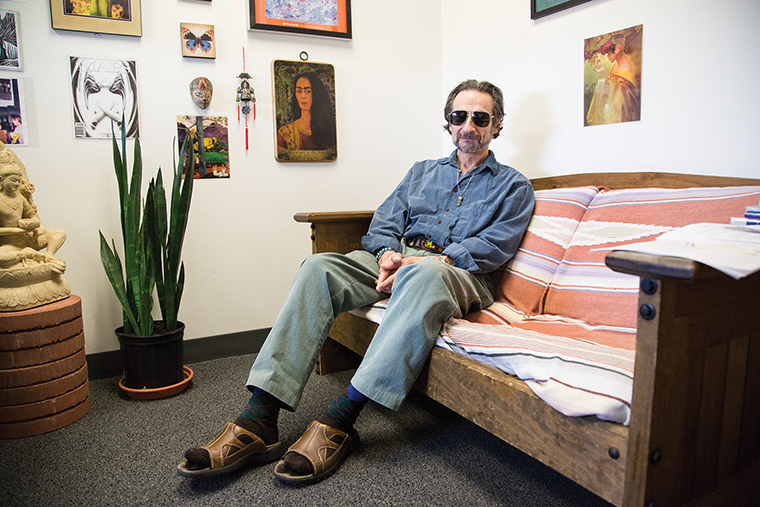Someone You Should Know: Louis Silverstein
Louis Silverstein, associate professor in the Humanities, History & Social Sciences Department, relaxes in his office while expressing his views on recreational marijuana usage.
April 21, 2014
Louis Silverstein, associate professor in the Humanities, History & Social Sciences Department, is known for calling marijuana the “food of the gods.”
Expanding on the belief that marijuana is an agent for spiritual transformation, Silverstein published the book, “Deep Spirit & Great Heart: Living in Marijuana Consciousness” in 2002, compiling the journals of a man named Ganja, who approached Silverstein while he was sitting under a palm tree.
From April 7, 1993 to Dec. 31, 1994, Ganja spent more than a year high on marijuana, keeping a journal of his self-discovery, documenting the ups and downs of his relationships to self, family, work, earth and sexuality. Ganja gave Silverstein the journals he worked on to publish after his death, with the intention of inspiring public discourse on weed, Silverstein said.
“Deep Spirit & Great Heart: Living in Marijuana Consciousness” shows the other side of smoking pot, Silverstein said. He explains that most people think of marijuana as harmful but the book explores one man’s path to articulate what he feels on the drug. In the book, Ganja explains how marijuana is “wisdom weed” to better path to happiness but the path includes a litany of sadness, joy and happiness.
Silverstein has also found and created “An Oral History Of Columbia College: A Telling of Columbia’s Story and Its Contributions To American Higher Education Through Personal Narrative” and a book called “Encountering Life’s Endings.”
The Chronicle spoke to Silverstein about his book’s character, marijuana and the growing acceptance of the drug.
THE CHRONICLE: Why do you think being a journal keeper for a book like this was important?
LOUIS SILVERSTEIN: The importance is manifold. One [reason] is that we human beings have a right to do with our bodies, minds and spirits as we wish to do as long as it’s not encroaching on the liberties of another person. Another importance is just in the American speed of freedom—freedom to be the person who directs your own body. Secondly, marijuana throughout history has played a significant role in what we call “raising consciousness,” which is allowing human beings to realize we are more than what we think we are. At our core, we are loving, compassionate and peaceful people. Our socialization and culturization over many, many hundreds and thousands of years has moved us away from our core. Marijuana usage allowed those to return to their core. Thirdly, in peaceful societies we say to people, “Be the change you wish to see in the world,” and marijuana allows people to be that change in themselves and in other people. The fourth major reason is not so much a war on drugs but a war on race in relation to drugs. They have hundreds and thousands of people in prisons because they have tried marijuana or have been caught doing a very low level of dealism as users. The lives of these people had been ruined. They are primarily people of color and lower socio-economic status. The war on drugs has really become a war on the poor and that is completely unjust.
CC: Do you think the acceptance of marijuana has changed throughout the years?
LS: Well the polls have certainly said that. The results are quite different than they were in the past and the most recent polls show more than 50 percent of Americans not only believe in the legalization of medical marijuana, but [also] the legalization of [recreational] marijuana. It is very different from [a few] years ago with 20–25 percent approval ratings saying they were in favor. So there has been a significant change.
CC: How has marijuana played a role in your life?
LS: I obey the laws wherever they are, wherever I might be. The times that I have used marijuana have been in places where marijuana is legal to use. Having said that, it has played a profound role in my life in making me realize there is a greater soul within me than I knew and it certainly was a key in opening that doorway, and it has certainly played a role in my relationship to my fellow creatures on planet earth. Realizing whether you are human, animal or in plant form, we are one interwoven web of existence. It has affected me in a very profound way in relation to peace and the ecological movement. It has freed my body in ways I could have never imagined before.
CC: What kind of criticism have you received about the book?
LS: The feedback that I’ve received has been accepted very positively and the largest amount of readers said it has profoundly affected their lives. They say that online and in person. Yes, I would imagine there are people who find what I am saying by taking the curtain off of marijuana as offensive for a variety of reasons, but I respect where they are coming from. But with rare occasion has anyone said that to me but I accept the fact that the people who need to keep their minds closed and narrowed for their existence. Of course we need to accept that.
CC: What do you think needs to happen to make marijuana legal?
LS: There are many voices speaking about a different story about marijuana, and those who are courageous enough are having a conversation about their relationship with marijuana [and] need to speak out because those who have had a negative relationship with marijuana and those who are unaware of consciousness raising speak out in public all the time. What I mean is, share your story and if you want to get personal, share what you know about marijuana wherever you are. The book is just one vehicle for change. We are headed for a state of greater consciousness.








